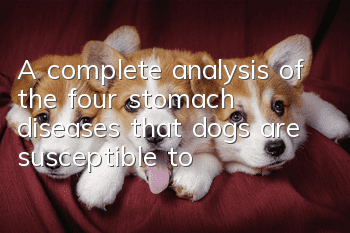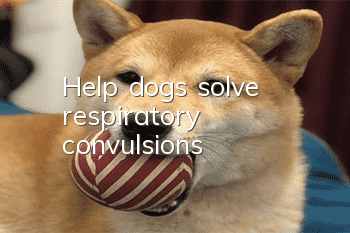A complete analysis of the four stomach diseases that dogs are susceptible to

1. Acute gastric catarrh
【Cause】
Gastrointestinal catarrh, that is, catarrhal gastroenteritis, is an inflammation of the gastrointestinal mucosal surface, accompanied by gastrointestinal innervation disorders and digestive dysfunction.
【Symptoms】
Sick dogs have loss of appetite or become disabled. Sometimes there is a licking habit, swallowing unpalatable, bitter, disgusting items, and a strong appetite. Bad breath and yawning. Bowel sounds are sparse and sometimes constipation occurs. The abdominal pain is obvious, the two forelimbs are stretched forward, and the body is lying in a cold and dark place. On palpation of the stomach, it is sensitive and painful. Vomiting is one of the main symptoms, and begins with the vomiting of mucus and gastric juices, sometimes mixed with blood, bile, and mucosal debris. Symptoms of dehydration occurred due to vomiting, sunken eye sockets, and reduced skin elasticity.
【Treatment】
Food therapy: Food should be stopped for 24 hours and water intake should be restricted. After 24 hours, give porridge, etc. Be careful to eat smaller meals more frequently.
Eliminate stomach contents: Vomiting at the beginning of the disease does not necessarily have to be stopped. Stopping vomiting is harmful, because the stomach is full or irritating substances are ingested. Vomiting can relieve the burden on the stomach and expel harmful contents. At the beginning of the disease, 3-5ml of apomorphine hydrochloride can be injected subcutaneously to induce vomiting and expel harmful substances in the stomach. If necessary, give the dog 20-50ml of paraffin oil or perform an enema, which can quickly clear the stomach contents.
Sedation and vomiting: rest quietly, intramuscularly inject chlorpromazine 1ml/kg body weight, and take 1-2 tablets of metoclopramide orally, twice a day. You can drink coffee from time to time, or you can use chamomile tea as a drink, which has an antiemetic effect. Severe vomiting can lead to water and electrolyte imbalance, and compound sodium chloride solution or 5% glucose solution can be given intravenously.
To strengthen the stomach and relieve pain: In order to stimulate the secretion of gastric juice and relieve lack of appetite, give dilute hydrochloric acid to the dog, 3 times a day, 0.2-1.0ml each time, dilute it with water and then take it. Pepsin 0.1-0.5g, add dilute hydrochloric acid, etc., dissolve in water, and take it before feeding. Put 10-20 drops of bitter tincture or gentian tincture in water and take it before feeding. Give yeast tablets, lactase enzyme, etc. to increase appetite.
[Doctor reminder]
Acute gastrointestinal catarrh in dogs is a common clinical disease. It is mostly caused by improper feeding, excessive meat or ingestion of rotten food, indigestion, etc. It is clinically characterized by digestive disorders, vomiting, diarrhea, abdominal pain, fever and metabolic disorders. It is characterized by acidosis (alkali). This disease can occur in dogs of all ages, genders, and breeds. Due to their weak constitution and digestive function, the incidence of gastrointestinal diseases is higher.
Acute gastric catarrh in dogs is a common digestive tract disease. It is mostly caused by eating indigestible or spoiled food. Sick dogs vomit a lot, causing water loss, making them thirsty and becoming greedy. However, drinking a lot of water can aggravate the disease.Vomiting symptoms in dogs. Finally, he screams, struggles everywhere, sunken eyeballs, and loses water. If the rescue is not timely or the treatment method is improper, this disease will cause the death of the pet dog. Therefore, owners must pay attention to the scientific feeding and management of dogs, ensure that the feed and drinking water are clean, and do not feed spoiled feed; feeding should be done regularly and quantitatively, and the feed should be prepared reasonably.
2. Chronic gastric catarrh
【Cause】
(1) Acute gastric catarrh becomes chronic gastric catarrh due to non-healing or repeated actions.
(2) Foreign bodies staying in the stomach cause long-term chronic irritation of the gastric mucosa and cause the disease.
(3) Nervous and endocrine dysfunction can also cause chronic gastric catarrh. Symptoms
(1) Depression, appetite varies from time to time, intractable vomiting often occurs after eating, and sometimes heterophilia occurs.
(2) Sick dogs and cats suffer from malnutrition, fatigue, and progressive weight loss. Anemia may occur in a few cases, and the mucous membranes may be pale and sometimes yellowish.
(3) Sometimes abdominal pain occurs, stomach bleeding, and black stool.
【Treatment】
Strengthen management: Strengthen feeding and management, and actively treat primary diseases. Give nutritious and easily digestible food, and feed it in small amounts and multiple times.
Stomach and antispasmodic: When gastric acid is lacking, take orally 0.2 to 0.5 ml of dilute hydrochloric acid, 0.1 to 0.5 g of pepsin, 3 times/day, or bitter stomach medicine. When gastric acid secretion is excessive, take proglutamine 0.1 to 0.5 grams orally, 3 times a day, or proglutamine 5 to 10 mg per kilogram of body weight, 2 times a day.
Symptomatic treatment: In cases of vomiting, intramuscular injection of vitamin B6 0.1 to 0.4 grams, 2 times/day. When bleeding occurs, 2 to 4 ml of Anluoxue should be injected intramuscularly, 3 times/day. In cases of anemia, deep intramuscular injection of 20 to 100 mg of iron dextran; or oral administration of ferrous sulfate, 0.05 to 0.5 g for dogs and 0.01 to 0.05 g for cats, twice a day. If there is abdominal pain, intramuscular injection of 654-2, 0.3 mg for dogs and 0.1 mg for cats; to eliminate inflammation, intramuscular injection of 30,000 to 60,000 international units of gentamicin, 2 times/day, etc.
[Doctor reminder]
Chronic gastric catarrh is a non-specific inflammation caused by gastric mucosal atrophy, hypertrophy, and severe lack of gastric digestive juice. This disease is more common in older dogs and cats. We usually use intestine-regulating and stomach-building drugs to treat chronic gastric catarrh in horses, but they have little effect.
Because some tissues and organs in the digestive system have been mechanically damaged and toxins by parasites to varying degrees, causing digestive dysfunction and insufficient nutrient supply. Therefore, sick dogs suffer from chronic diarrhea, anemia, enlarged abdomen, edema, physical weakness, fatigue and loss of appetite. Therefore, after expelling internal parasites, Chinese medicine must be used to strengthen the body, dispel evil, and strengthen the spleen.A two-pronged approach of replenishing qi, harmonizing and stopping diarrhea can restore gastrointestinal function, enhance physical fitness, and improve the body's immunity.
- What is the efficacy of six-linked hyperimmune serum for dogs?
- What to do if your dog has enlarged meatballs
- How to train a puppy? What should you pay attention to when training puppies?
- How to make a dog come when it barks?
- Top 10 ways to train your dog to eliminate at designated points at home
- What training does a German Mastiff need?
- Four Principles of Dog Breeding
- How big can a Papillon dog grow? How should a Papillon dog be fed?
- Symptoms of kidney failure in dogs
- Can dogs eat yam?



